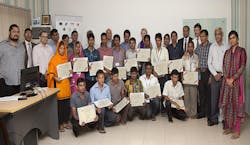Just months after 1,100 workers died in the Rana Plaza collapse and 112 workers died in the Tazreen Fashions fire near Dhaka, the Aswad garment factory in Gazipur Dhaka erupted in flames. Approximately 170 people were working there at the time, and most managed to escape the burning building, unlike the Tazreen fire, where exits were blocked and doors locked and many of the workers either burned to death or died after jumping out of the windows to escape the fire.
The Aswad factory’s general manager, Rashiduzzaman Mandal, was killed, along with nine other workers. The factory director, Emdad Hossain, was injured in the fire. It took firefighters 10 hours to get the blaze under control.
The cause of the fire is not known, but experts speculate that 80 percent of factory fires in Bangladesh are caused by faulty wiring.
Nearly three and half million Bangladesh workers work in Bangledeshi garment factories. The ready-made garment (RMG) industry is economically vital to the country, exporting goods worth US$19.3 billion for the 11 months that ended in May 2013, a 12 percent increase from a year earlier.
Taking Steps to Improve Working Conditions
The efforts of the government of Bangladesh and a range of national and international actors in the RMG sector have been boosted by an innovative program from the International Labour Organization (ILO) in partnership with the governments of the Netherlands, the United Kingdom and Canada.
“The rapid growth in Bangladesh’s garment industry has provided vital jobs to women and men and is helping to pull them and their families out of poverty. However, there is an urgent need for decisive and collaborative action to make decent work a reality. This program will improve conditions of work, especially safety, and help generate sustainable economic growth and investment,” said ILO Director-General Guy Ryder.
The multi-year program will focus on supporting the Bangladeshi National Action Plan for Fire and Building Safety developed in the wake of the Rana Plaza collapse in April. The National Action Plan calls for an assessment of all active export-oriented, RMG factories in Bangladesh to be completed by Dec. 31.
The plan is supported by other parallel initiatives focused on the RMG sector in Bangladesh, namely the Accord on Fire and Building Safety in Bangladesh, which was signed by over 80 leading clothing brands and retailers, and the Alliance for Bangladesh Worker Safety, a binding five-year undertaking by North American apparel companies and retailers to improve safety in more than 500 factories.
Opportunities for Work
A group of 22 students from rural Gazipur and remote North Bengal, Bangladesh’s poorest region, now will be employed in the RMG sector after completing a three-month skills training program. An additional 26 students just started the training program. After a 3-month training period and subsequent skills assessment, trainees will be certified and employed as junior machine operators in local RMG factories.
“Bangladesh has made great progress in recent years. It is fortunate to have a young, dynamic work force. Giving them the skills for future employment will be a key to Bangladesh’s success. The TVET Reform Project is making that happen, through changing the way that skills development works and encouraging initiatives such as these,” said William Hanna, EU ambassador to Bangladesh.
The project is a partnership between East Knitting & Dyeing Industries, IDLC Finance, the ILO TVET Reform Project, Gazipur Technical School and College, Care Bangladesh and Shiree.
“The management of Far East Knitting and Dyeing Industries sees this as a great opportunity for us to give back to the very group of people who help us achieve success at an international level. Our challenge and objective is to see these challenged people turn into trained hands and live their lives with dignity,” said Asif Moyeen, managing director, Far East.
The project was conceptualized by the IDLC and the ILO and based on a learning-and-earning model developed by the ILO TVET Reform Project, funded by the European Union. The same model also is being used in Chittagong Women’s Polytechnic Institute, and five more institutions in the wider Dhaka region will begin using it by the end of 2013. Far East and IDLC are sponsoring the project. Gazipur Technical School and College, under the Directorate of Technical Education of the government of Bangladesh, is providing the training. CARE Bangladesh and Shiree are sourcing participants from North Bengal.
“We are proud to be associated with this noble initiative as part of our CSR commitment, and we want to contribute more towards empowering people in future”, said Selim R.F. Hussain, CEO and managing director, IDLC.
EHS Today will have a special section on worker safety in Bangladesh and its impact on the global supply chain in the October issue of the magazine.
About the Author

Sandy Smith
Sandy Smith is the former content director of EHS Today, and is currently the EHSQ content & community lead at Intelex Technologies Inc. She has written about occupational safety and health and environmental issues since 1990.
